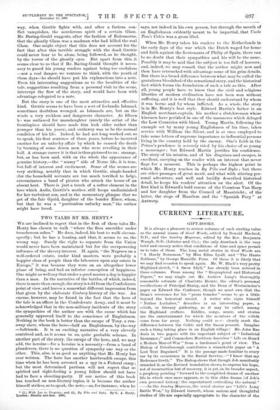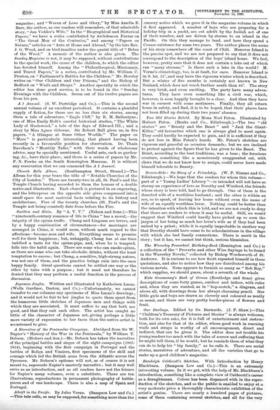CURRENT LITERATURE.
GIFT-BOOKS.
It is always a pleasure to review volumes of such sterling value as the annual issues of Good Words, edited by Donald Macleod, D.D., and the Sunday Magazine, edited by the Rev. Benjamin Waugh, D.D. (Isbister and Co.) ; the only drawback is the very brief and cursory notice that conditions of time and space permit us to take of them. The long serial stories in Good Words are "A Hardy Norseman," by Miss Edna Lyall, and "The Haute Noblesse," by George Manville Fenn. Of these it is likely that
we may find occasion to speak again. Mr. W. Black's very pretty Highland sketch, "A Snow Idyll," has already been noticed in these columns. From among the "Biographical and Historical Papers," we may single out Mr. Andrew Lang's thoroughly reasonable estimate of Charlotte Brontii, the editor's personal recollections of Principal Shairp, and the Dean of Westminster's paper on Edward the Confessor, though we must own that the Dean's reverence for his "pious founder" seems to go a little beyond the historical record. A writer who signs himself
"Nether Lochaber," describes in an interesting paper, a ceilidh, or literary gathering, as it may be called, among
the Highland crofters. Riddles, songs, music, and stories are the entertainment for which the msmbers of the c4aidh come from far away. Nothing could nior 3 clearly mark the difference between the Celtic and the SaLon peasant. Imagine such a thing taking place in an English village ! Mr. John Rae deals in two papers with the important subject of "Industrial
Insurance ;" and Commodore Markham describes "Life on Board
a Modern Man-of-War" from a landsman's point of view. The Bishop of Peterborough contributes a remarkable paper on "A Lost Text Regained." It is the passage made familiar to every ear by its occurrence in the Burial Service,—" I know that my Redeemer liveth." The Bishop shows that though Job manifestly intended it, as the Revised translation shows, to express his hope, not of resurrection but of recovery, it is yet, in its broader aspect, a prophesy pointing "forward to the completed drama of another life in which once more appears, as in this older drama [of Job's
own personal history] the supernatural controlling the natural." —In the Sunday Magazine, the serial stories are "Life's Long Battle Won," by Edward Garrett, whose serious and thoughtful studies of life are especially appropriate to the character of the magazine; and "Woven of Love and Glory," by Miss Amelia E. Barr, the author, as our readers will remember, of that admirable story, "Jan Vedder's Wife." In the "Biographical and Historical Papers," we have a series contributed by Archdeacon Farrar on "The Great Men of the Centuries," and among "Papers on Nature," articles on "Ants at Home and Abroad," by the late Rev. J. G. Wood, and on bird-families under the quaint title of "Babes of the Wood." A memoir of the author is also given. The Sunday Magazine is not, it may be supposed, without contributions to the special work, the cause of the children, to which the editor has devoted himself. Among the "Philanthropical, Missionary, and Travel Papers," is a series, contributed by Mr. William C. Preston, on "Parliament's Battles for the Children." Mr. Horsley writes on "Our Children and Our Prisons," and the Bishop of Bedford on "Waifs and Strays." Another specialty in which the editor has done good service, is to be found in the "Sunday Evenings with the Children. Seven out of the twelve papers are from his pen.



















































 Previous page
Previous page